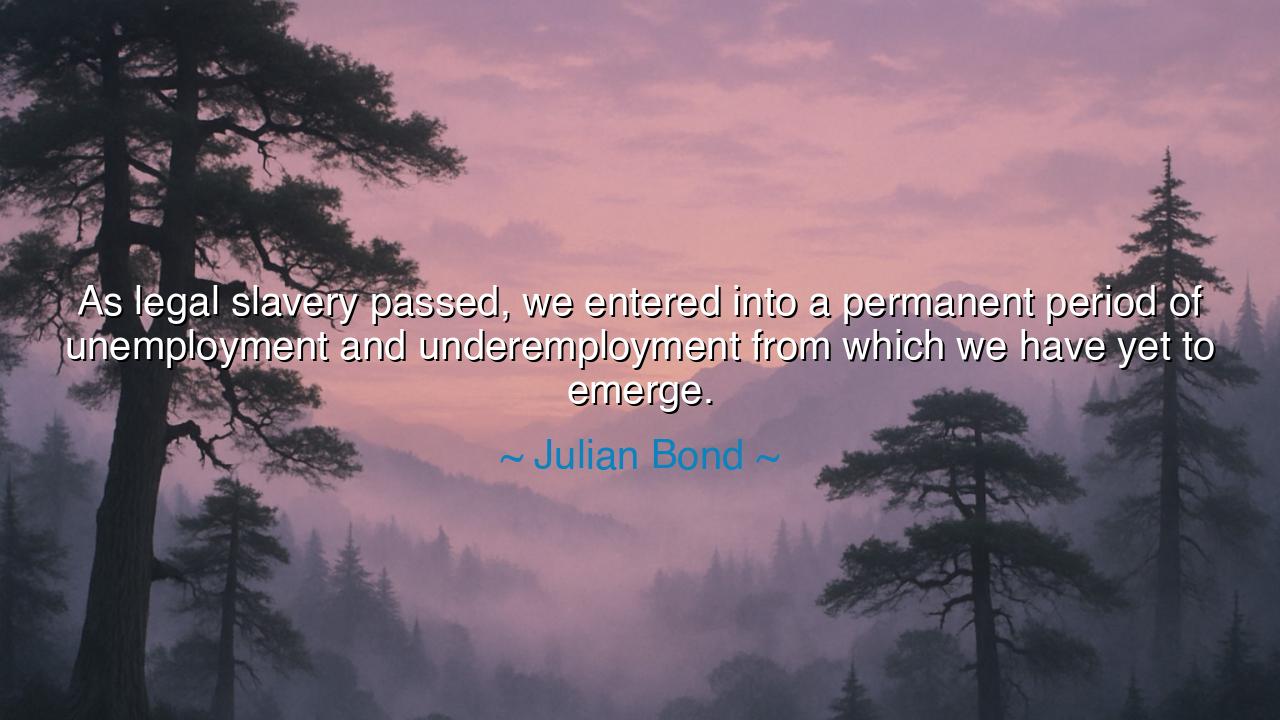
As legal slavery passed, we entered into a permanent period of
As legal slavery passed, we entered into a permanent period of unemployment and underemployment from which we have yet to emerge.






When Julian Bond declared, “As legal slavery passed, we entered into a permanent period of unemployment and underemployment from which we have yet to emerge,” he was not speaking only of labor or economics — he was speaking of freedom unfulfilled, of a nation that abolished chains but never fully broke them. His words carry the weight of centuries — the grief of ancestors whose bodies were freed but whose opportunities remained bound. Beneath this statement lies a profound truth: that emancipation without equity is a freedom still half-formed, and that the legacy of bondage does not vanish with law, but lingers in the structures of society, shaping lives long after the last whip has fallen silent.
The origin of this quote arises from Bond’s lifelong struggle as a civil rights leader, scholar, and moral voice for justice. As one of the founders of the Student Nonviolent Coordinating Committee (SNCC) and later as the chairman of the NAACP, Bond saw firsthand how the promise of liberty proclaimed by the Emancipation Proclamation and the Thirteenth Amendment had been hollowed by centuries of systemic inequality. He spoke from the vantage of a man who knew that the end of legal slavery did not mean the end of oppression — only its transformation. The plantation became the factory floor, the field became the ghetto, and the whip was replaced by the invisible chains of poverty and prejudice.
To say that the formerly enslaved entered “a permanent period of unemployment and underemployment” is to reveal the cruel continuity of economic subjugation. After emancipation, millions of freed people found themselves without land, without education, and without wages fair enough to live upon. Many were forced into sharecropping, a system that trapped them in perpetual debt to the same masters who once owned their bodies. The name of the institution had changed, but its spirit endured. As Bond suggests, the freedom that was promised became a mirage — visible, perhaps, in law, but elusive in life. True liberation requires not only the right to move, but the means to stand.
History gives us many mirrors of this truth. Consider the fate of Reconstruction, that brief and shining moment after the Civil War when Black men held office, built schools, and voted for their future. For a time, it seemed that the nation might heal its wound. Yet by the late 1870s, those hopes were crushed beneath the weight of Jim Crow laws, racial terror, and economic exploitation. Factories refused to hire Black laborers; unions often excluded them; even the federal government withdrew its protection. Thus, the promise of equality collapsed into a system where, though no longer enslaved, the descendants of slaves were condemned to the margins of labor. Bond’s words echo this enduring sorrow — that what began as freedom became a different form of captivity, woven into the economy itself.
But his message is not only lamentation; it is awakening. Bond challenges us to see that injustice evolves with time — that oppression does not die but adapts. In his voice, one can hear the wisdom of the ancients: that a people who do not understand the roots of their suffering cannot uproot it. He calls upon us to confront the truth that inequality of work and wealth is not accidental, but historical — the residue of slavery transmuted into modern poverty. The unemployed and underemployed of today, he reminds us, walk upon the same ground once tilled by enslaved hands, bound not by law but by circumstance, denied the full fruits of their labor.
And yet, Bond’s quote also carries the flame of resilience. For though his words mourn a long shadow, they also affirm the endurance of those who live beneath it. The descendants of the enslaved have become teachers, leaders, and creators — not because the world gave them opportunity, but because they forged it from adversity. The spirit that once survived the lash still survives the layoff; the soul that endured the auction block still endures the inequity of the modern workplace. Bond’s warning, then, is also a call: that freedom must be fought for not once, but always, in every generation, in every system, until equity becomes as natural as breath.
Thus, the lesson for all who hear these words is clear: Freedom without justice is only half a revolution. The passing of legal slavery was a beginning, not an end, and the work of liberation remains unfinished until every person can labor with dignity and live without fear of want. Let us remember Julian Bond’s wisdom — that history’s wounds cannot be healed by silence, and that peace cannot be built upon inequality. Each of us, in our time, must labor for the completion of that great promise — to build a society where no man’s worth is measured by his bondage, and where the light of freedom shines not in law alone, but in the lives of all who walk beneath it.






AAdministratorAdministrator
Welcome, honored guests. Please leave a comment, we will respond soon